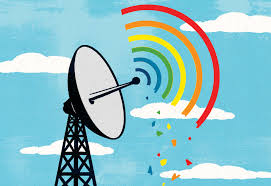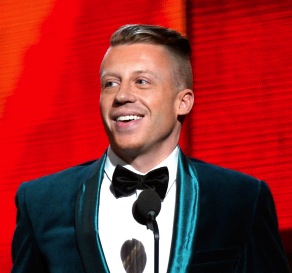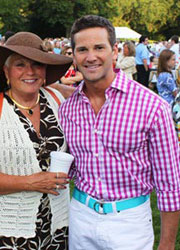
Today, over drinks, I was talking with a friend about online dating. I’m personally partial to online dating for two reasons. 1) Talking to strangers is hard and 2) it takes a lot of the guesswork out the equation for queer people.
As we have discussed here briefly before, public space is heterosexual by default. We need look no further for evidence of this than rainbow flags and “safe space” stickers on queer (or queer friendly) businesses. While these spaces are crucial for many queer people, their very existence serves to reinforce the unspoken heterosexuality of the un-marked spaces around them.
In the course of the conversation, my friend asked if I could “tell” when someone in a room was gay. The short answer is, to some extent, I think that I can. The idea of “gaydar” is pretty well entrenched in both gay culture and the mainstream at this point. Regardless, I don’t think it’s so cut-and-dried. I don’t think I can tell who every gay guy in the room is. My response was something like “I think I can sometimes tell, but there are probably gay guys here that I wouldn’t guess were gay.” Fortuitously, when I got home, I saw this video:

Click to watch the full video
I really recommend you watch the whole thing. I’ll wait.
So, that happened. I honestly don’t even know where to start with this video. First and foremost, I guess what bothers me about the whole “gaydar” debate is that I’m not really sure why it’s important to anyone who isn’t gay. Unfortunately, we live in a world where hitting on the wrong person can get you killed, and I so don’t blame my queer family for wanting a leg up on the situation. Why anybody who identifies as straight would want or need to know if stranger is gay, however, is beyond me. It occurs to me that this is either:
a) an extension of our recent cultural obsession with the lives of total strangers
b) a way to reinforce one’s own hegemonic masculinity in comparison to a stranger
c) a justification for micro and macro aggressions against queer people or
d) all of the above
Nonetheless, it would appear that it is, for whatever, important to this blogger, Mark Miller, and his “professional straight man” guest to figure out exactly how and why he does, or does not, have gaydar.
We open on a charming on a charming rendition of “What, what, in the butt,” because nothing says “I’m still one of the guys” like satirizing a stigmatized sex act in which you most likely participate.
I think what most bothers me about this video is that it’s one more way in which my sexual identity gets to be all about straight white men. Nothing’s ever about straight white men, so I’m glad they’re finally getting their day in the sun. From the very beginning, it’s clear that Miller is either still really uncomfortable with his own identity (which is totally valid, and everybody gets to make that trip in their own time) or is specifically pandering to his straight best friend. Instead of saying, “A year ago, I come out to my roommate about identifying as gay,” he says
“A year ago, he found out that I don’t like chicks”
Let’s just parse this out. First, he “found out”? Was there some sort of investigation? Secondly, there are plenty of ways to express your gay identity that don’t involve the overt misogyny of referring to women as “chicks.” Finally, “not liking chicks” doesn’t make you gay. You also have to “like dudes.”
But don’t worry, the straight white man-splaining is just getting warmed up. We’re then treated to Miller’s guest’s opinion that, until you’re close to a gay person
“…it’s like, it doesn’t really exist. Like it exists but like, you don’t really notice it.”
You heard it here first, gays. Until this one straight guy discovered a covert gay living in his very house, homosexuality itself did not exist.
That’s maybe not what irks me the most about this quote though. Yes, it is ridiculous that this guy thinks because he’s not conscious of a group of people, they don’t exist. What bothers me most is that, as any swishy former theater kid can tell you, straight identified men often have the best. gaydar. ever. Nobody is better at picking up on non-hegemonic masculinity than a person whose entire identity as a “straight dude” depends on the existence of an other. Straight masculinity as we know it today is entirely contingent on the existence and identification of men who do not conform to the ideal.
“DJ Donny D,” apparently not content with just ripping off hip-hop culture, then goes on to tell us the four characteristics that trigger his gaydar which, remember, 30 seconds ago Miller established that straight guys don’t have. For those who didn’t make it through the whole video, allow me to enlighten you. You too may spot a gay in your very midst.
1. Really clean-cut hair
2. Really in shape
3. Too small clothes (gripping of the arms)
and apparently the biggest giveaway
4. How they talk
It’s hard to know where to start here, because there’s just so much to say. I just got my hair cut on Friday, and it didn’t even occur to me to assume that every. single. person. at the salon was gay. How silly of me!
For those who watched the video, you’ll remember that the comment about being “really in shape” was made at the gym. Apparently straight men are supposed to go to the gym but just be really bad it?
Donny, as I assume (but to be fair, do not know) his mother actually named him, uses his own “straight” clothes to talk about the tell-tale “gripping of the arms” that makes a T-shirt gay (unless it’s on Donny, I guess?)
Nonetheless, and according to Donny we’re all in agreement on this, we’re told that gays just talk gay. In the outtakes, Miller gives the example of saying “That’s so Gucci.” Uh-huh.
This video makes a few things abundantly clear. A certain segment of gay culture, the kind of “hot gays” you see on TV with their six-packs, and brand-name clothes, fits perfectly within the consumerism of which our culture has become so enamored. We see this at the very end of the video when DJ Jazzy Jeff tells us that
“I’m what they call metro, where you dress like you’re gay but you’re not gay. You love women but you like to look good.”
No, Donny. You don’t look “good” –by your own definition, you look “gay.” You’d set off your own gaydar. You’re just able to disguise your co-opting of “everything but the hard parts” of being gay as consumerism, a value held extremely dear by our culture.
Beyond this, though, the video drives home another, bigger point. Gaydar is not actually about knowing who’s gay and who isn’t, as if we ever truly could. Maybe for queer people, this is part of the idea. But straight people, especially straight men, have no reason to know or care who’s gay. They are, and we all are, policing masculinity. Donny can’t know somebody is gay any more than I can. What he can know is how much that person deviates from his own ideas of acceptable masculinity. And as a straight guy, not only can he know, he must know. Especially in an age where the performative lines between gay and straight are increasingly blurring, his very identity as a “straight dude” depends on his ability to point out the other.
Thank God his roommate gave him the chance.
















